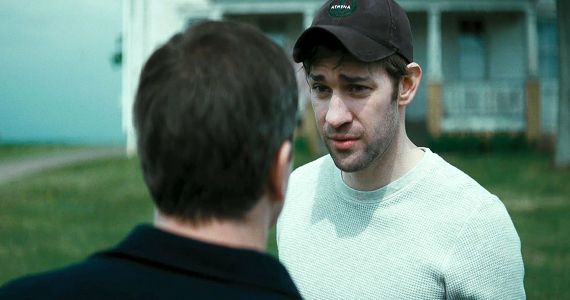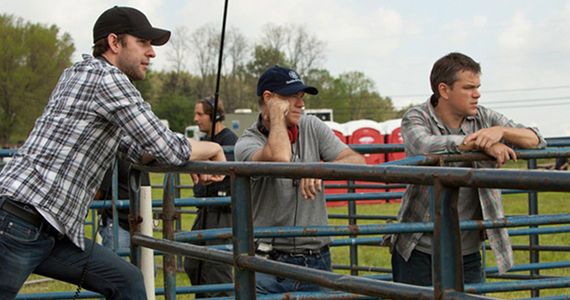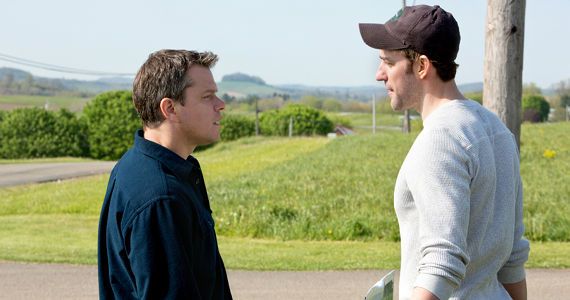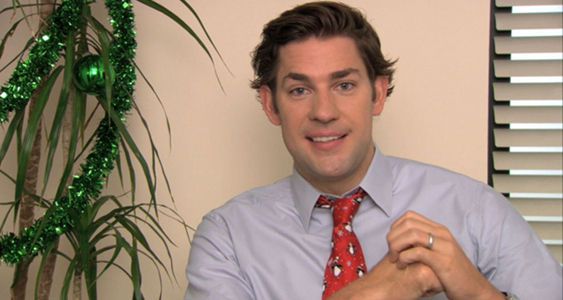This is John Krasinski's time to shine on the big screen. Best known for his role as Jim Halpert on The Office, Krasinski actually graduated as a playwright with honors from Brown University and makes his screenwriting debut with Promised Land.
Krasinski took an original story written by Dave Eggers, writer of Away We Go (which Krasinski starred in) and Where the Wild Things Are, to his good chum, Oscar-winning screenwriter/star Matt Damon, and the two banged out a heartfelt film with an environmental message.
Kransinski and Damon both star (as well as co-produce) and are joined by a stellar cast including Oscar-winner Frances McDormand (Moonrise Kingdom, Fargo); Rosemarie DeWitt (Rachel Getting Married, Company Men), Scoot McNairy (Monsters) and Hal Holbrook (Into the Wild, Water for Elephants). Focus Features and director Gus Van Sant jumped on board and it's been a fun journey for Kransinski. Damon was initially slated to make his directorial debut, but due to scheduling conflicts had to call in a favor to old pal, Gus Van Sant, (who directed him in Good Will Hunting and Gerry) at the last minute.
Set in the rural Pennsylvanian town of McKinley, Damon stars as Steve Butler, a natural gas company rep who encounters more resistance than he bargained for when trying to buy up drilling rights on struggling farmers' land. After purposely fitting in with the local folk, Butler - along with his no-nonsense business partner, Sue Thomason, (McDormand) - find themselves up against local opposition in the form of a retired schoolteacher, Frank Yates (Holbrook) and a grassroots activist, Dustin Noble (John Krasinski), who suddenly sails into town.
We sat down with Krasinski, who pointed out that this is not a political movie about anti-fracking, as has previously been reported. He claims it is instead a beautiful human story that is close to his heart, since his father grew up in small steel-work town and faced similar issues.
SR: What attracted you to write this story?
JK: I hadn't written an original screenplay before and I had been thinking about things that mean a lot to me. One of those things is my dad, so subconsciously I came up this idea. My dad grew up in a small steel town just outside of Pittsburgh. His dad worked three jobs, and the family didn't have a whole lot. I remember him talking about his childhood, which sounded so bright and positive and I remember as an ignorant eight-year-old, saying: "So your childhood must have been awful?" And he said: "No, it was fantastic. We had an incredible community of people, friends and family and there was this belief that tomorrow was going to be a better day." And that pure idealistic view stuck with me throughout my entire life. As I grew older, I realized that, as a country and as a people, we've sort of moved away from that ideal of community and the strength we have together. So that was the story I wanted to tell.
SR: How did you parlay this belief into the story of the community in McKinley?
JK: I wanted to tell a story of a community like my dad's who is going through some tough times. So the idea of Natural Gas came on to the idea a little later. We found it in some research and reading about this drilling down series in the 'New York Times.' '60 Minutes' had done a piece about people who were literally turning into millionaires over night. So we thought: "This is it." This is the backdrop we can put into the original idea that we already have. It's a really high-stakes poker issue in that there is so much potentially to gain and so much potentially to lose, no matter which side of the issue you fall on.
SR: How did the locals react when the film crew arrived at their small town?
JK: When we rolled into town in Pennsylvania, the people were kind and generous to let us in and they really weren't inhibited at all to come up and tell us how they felt. And a lot of people were like: "Don't do this! This is really important to us and it saved us." We had people tell us that they had farms in their family for 150 years and they don't have the money to pay the mortgage anymore. They said: "I don't want to be the person's whose name is on the list who gave that property up, I can't do it." So when you see what an emotional conflict this is for people, you realize what an incredible opportunity we had to tell the story of these people.
SR: Did the local people help you to keep this story balanced?
JK: I remember the day when we had to write the town hall scene where the community stands up. I remember Matt saying: "This has just become the anti-fracking movie. For anyone who doesn't want to spend the time to research it or watch the movie, this has just become a political anti-fracking movie." And we never spoke it again. And it was the fact that he had been down this road when people will come out at you for no reason and not give you the benefit of the doubt of actually watching the film, and he said as long as you're confident in what you're doing in which we were, then let's just keep going.
SR: The townspeople looked so convincing, did you use professional actors or locals?
JK: No, that was Gus. When he read the script, he knew exactly what we were going for. Matt told me Gus does this all the time and he did the same thing on 'Good Will Hunting,' is whatever we said about characters not being one dimensional, he takes it times ten. He is the magnifying glass of stories that they don’t make sense if you try to manipulate people into believing that this is how it is. You have to show them how it is. So literally walked into the bar we shot in the local town at 2pm on a Tuesday and there were some great characters in there. He said: "We're making a movie, does anyone want to be in it?" The bartender in the movie, that's her bar, she owns it. Gus is just that type of director. He looks at what is there instead of what is around us to recreate the feel of the film.
SR: Did you write with Frances McDormand in mind for the role of Sue? She added some light comedy relief.
JK: She is great in this. We wrote the first draft of the script in six weeks and it was definitely a wild beast we hadn't reigned in all the way. We were writing for Fran in mind. So Matt suggested we might as well send it to her now to see if she's interested. And she signed on immediately and that was one year before we began shooting. So once we had Fran's voice in our head, we went full tilt with that character. She was one of our favorite characters to write because she is this voice of reason. The only party for her is her family. Fran brought a whole lot to that part. She came up with some great color for her character and we listened and it went all in to the script.
SR: What was your writing process like with Matt? Did you have back to back computers, or how did it work?
JK: We had one computer. He was shooting 'We Bought a Zoo' at the time and I was shooting The Office, so we were kind of moonlighting. I would drive to his house every weekend, he wins by default just because he has four beautiful daughters. I would show up at his house Saturday morning for breakfast and we would write up until dinner and I don't know how we got all the work done that we did, because we popped in 'The Little Mermaid' seventeen times…
SR: For you obviously?
JK: Of course, it was for inspiration! (Laughs) You didn't see that correlation? But we worked really well together. We just clicked. We have a very similar voice and outlook on life in that we are eternal optimists and we both knew the need for humor every step of the way, otherwise the film would become too heavy handed. We would act every part out. I remember Matt saying it was a letdown when we got to set and he was only playing one character. (Laughs)
SR: How did it feel as a writer to hear your words on set? Were you distracted as the actor at any point?
JK: Luckily my scenes were just with Matt for the most part. So I didn't have as many opportunities as Matt did which is when you say a line and you're waiting to hear the line you wrote back. But for me, not only hearing people say the lines we wrote, but I'll be honest, this whole experience has been totally surreal. This is a big transitional moment for me with 'The Office' ending so I think there is so much more to this experience than just the fact that it was my first screenplay or getting to work with those great actors. Being a part of something this special at a time when I'm losing something that's been a vital part of my life, if not a defining moment of my life, being a part of a family and being defined as part of my life coming to an end, having this special opportunity to transition through has been a gift is an understatement.
SR: You studied screenwriting at Brown, so was writing always your main goal and you just fell into acting?
JK: I got to Brown and had a weird thought that I might potentially play basketball (laughs), which ended in about thirty seconds when I walked in the gym and saw the team. And so I walked across the campus and pulled down a flyer for a sketch comedy group as I had never acted before. I got in. And the only reason why I acted in school was because of the community, like I was in the chorus of every play, I was never really the lead. I was an English major and my whole goal was to be an English teacher. You can't graduate Brown with a Creative Writing degree unless you do the Honors program which means you have to be an English major and, then you apply to be in the playwriting group and I was lucky enough to get in. I was the type of kid if it wasn't on the radio, I hadn't heard the song and I hadn't seen films unless they were in the Megaplexes. The whole experience I had at Brown was the most eye-bending experience and I didn't even need drugs!
SR: Your parents are in the medical field, did they expect you to follow suit?
JK: No, I have the most incredible parents and they didn't put pressure on me. I grew up in a house and no matter what they thought of things, it was always about my choice. After theatre school at Brown, I knew I wanted to give acting a shot. I remember telling my parents that I was going to New York to become an actor and my mom's first response, was: "Great, but the only thing I ask is that in three years if you don't have a bite, then you've got to pull yourself out because as a mother I could never ask you to give up on your dreams." I thought that was incredibly wise and fair. And sure enough come around three years, I called my mom and I said: "I'm out, you're right. It's not working out." And it was my mom who said: "You know what? There are a few more months to end of the year, just stick it out." And three weeks later I got 'The Office.'
SR: Wow!
JK: Yep, so my mom kept me in the game and I owe her ten per cent on everything. (Smiles)
SR: What will the audience take away from this movie?
JK: We're hoping people will take a minute to realize that we're all a part of a community and we have so much say and that these days of electing people who will take care of us will not happen. This is a much more complicated time and a much more complicated landscape.
Promised Land is now in theaters.




